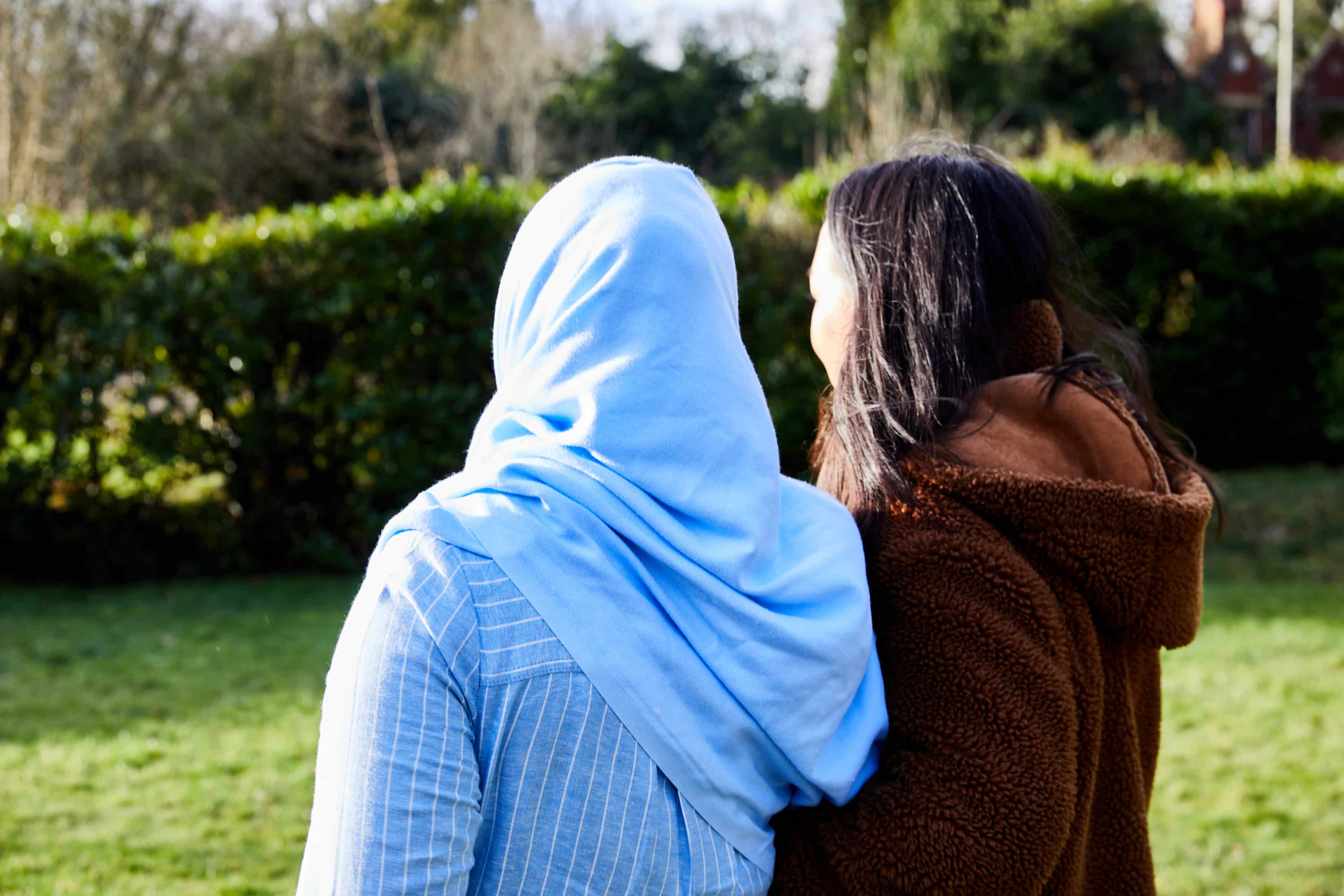
A Spotlight on Befriending
In response to feedback from our graduates, we’ve recently introduced a new befriending service, creating meaningful connections. We spoke with Dionne Widgerey, Progression Programmes Lead, to learn more about befriending. We strongly believe in sharing our learnings so other organisations and partners can gain a deeper understanding of the impact of this approach.
Dionne, what inspired the creation of the befriending service?
When I started my role at BB I took time to understand the needs of the women. I observed the powerful sense of connection, trust, safety and belonging they experienced at the programme, though realised when it ended feelings of disconnection, isolation and loneliness would return for many.
Having previously coordinated a homeless befriending service, I was already aware of the positive impact befriending can have on isolated and disadvantaged individuals. I felt confident that introducing befriending as an offering could empower women to continue moving forward on their journeys whilst maintaining a sense of connection.
Could you tell us what befriending is all about?
For me, befriending is all about connection – it’s essential for our wellbeing, though for many BB women their previous experiences of trauma and other challenging circumstances, create barriers to experiencing this.
Befriending offers a weekly call from reliable and trustworthy volunteers. It’s a safe space to talk and to be listened to without judgement, there is no set agenda – it’s a regular friendly chat.
Our volunteers are women from all walks of life who offer the gift of time to connect with another woman for up to 16 sessions. We simply could not run the service without the support and commitment of our volunteers.
We ask that all volunteers complete a series of trauma-informed training modules in preparation for the role. These modules include sessions on understanding power and privilege, boundaries, safeguarding, communication skills and preparing for endings.
New ideas take lots of investment, time, energy and brain power! Can you tell us more about the process for developing befriending at Bramber Bakehouse?
I was able to draw a lot from my previous experience of coordinating a telephone befriending service during Covid. There was a lot to consider and so I developed a project work plan.
I joined Befriending Networks, who provide training, resources and support to the sector – they were my ‘go-to’ for invaluable advice and support for setting up the service.
In addition I carried out research into examples of best practice, particularly focusing on services supporting women, refugees & asylum seekers and other multiple disadvantages.
What was the biggest challenge you faced in setting up the befriending service?
Developing a service from scratch is challenging. There was a lot of critical thinking, problem solving and learning on the job. I spent a lot of time planning as naturally I wanted the service to be the best it could be for the women – though I came to realise that seeking perfection was the enemy of progress! I had to accept that the service was “good enough” to launch as a pilot – which was helpful for testing on a small scale, and to learn and adapt as necessary.
Were there any unexpected moments or learning curves during development?
Navigating the digital meeting platform and supporting matches who lack confidence with technology has been a challenge. We rely heavily on online communications in our work these days, but for many it’s not always accessible.
I recently noticed that two individuals who expressed interest in befriending during the programme hadn’t taken action to self-refer via the website. I realised there was a confidence barrier and offered to complete the form with them over the phone. The self-referral via the website was introduced to increase agency for the women – but it was also creating a barrier which we’d initially overlooked.
I am finding that emails can be ineffective for communicating with some women, a more direct approach via text or WhatsApp seems to be better for eliciting a response.
How have you gathered feedback from beneficiaries and why has that been important in the process?
Throughout the match I encourage feedback from both parties. Mid-way and exit review meetings are built into the support, which help to check if the service is meeting their needs and provide an opportunity to share feedback and make suggestions for improving the service.
Hearing the difference the service is having on befriendees wellbeing, in their own heartfelt words, is so uplifting and makes the work worthwhile. Being able to share examples of what they’ve said about the experience really helps to promote the service to new women coming though the programme.
Can you share an example of how beneficiary feedback led to a change or adaptation in the service?
Usually befriending sessions are firmed up to take place at the same time each week which establishes a sense of routine and consistency.
We encourage agency and responsibility in the women, but there have been occasions when befriendees forget about their session. By talking about what would help, we agreed receiving a reminder text message would be a helpful prompt. This is an option now offered to all befriendees.
What has surprised you most about the feedback you received – either positively or constructively?
I am regularly moved by the feedback and gratitude I receive from the befriendees, and how much they look forward to their weekly calls.
I recently learned a match read books in between calls and connect over their reflections. Both are refugees and are supporting each other with their English language confidence which has been an unexpected outcome!
What changes have you noticed in the women participating in the befriending service?
There have been some women who present as quieter or less confident during group programme activities, but given the opportunity to connect on a 121 basis with myself and their befriender, this seems to give them more confidence. Having a space to be heard is empowering.
Since launching the service in April 2024, how many women have been impacted by befriending?
To date we have accepted 9 referrals. 3 of the matches have successfully completed and 1 is ongoing. The 5 recent referrals are in the process of assessment and matching and are due to commence their 16 sessions very soon.
Our five volunteers are also positively impacted through the health and wellbeing benefits of volunteering.
Can you share a story of someone whose journey was especially impacted by befriending?
Maria self-referred after the baking & wellbeing programme ended. She was housed in the asylum hotel outside of Brighton and was feeling very isolated. She hoped a befriender would be someone regular to talk to.
“It’s difficult to talk to others in the hotel as they have their own problems.”
Maria lacked confidence in spoken English.
“Sometimes I worry about my English, I understand more but when I talk (it’s) more difficult. It would be good to practice my English”.
We quickly matched Maria with a trained befriender and both were very committed to the weekly online sessions. At the end of the support Maria strongly agreed her hopes and expectations for befriending were met.
“My befriender was a great person and it was a place where they listened to me. It’s a nice time. I was waiting and happy to have my meeting every week.”
Maria was able to:
- Increase her confidence in speaking English
- Access education as a result of signposting including English and digital courses
- Self-advocate to access mental health talking therapies support
What has been the most rewarding part of delivering these new services?
It’s rewarding to be able to support the continuation of the women’s journey beyond the group baking, wellbeing and life skills programme.
Personally for me, a significant reward has been building the capacity of BB through the support of brilliant volunteers. We are now able to provide an additional 16 weeks of dedicated 121 support to women, which simply wouldn’t be possible without our small team of befriending volunteers.
What do you hope for the future of befriending at Bramber Bakehouse?
I hope referral numbers keep increasing as women learn about the difference befriending can make to their wellbeing.
Managing a trauma-informed befriending service is time consuming and admin heavy. In order to meet demand I hope we can secure future investment to build our staff team capacity, to accommodate coordinating more matches and supporting and growing our volunteer team.
If you could expand or enhance these services in any way, what would that look like?
Distance-based befriending has been an excellent option for increasing connection opportunities for women who are based all over Sussex. Though wouldn’t it be wonderful to offer in-person befriending!?
What advice would you give to others trying to develop similar services in a trauma-informed or empowerment-focused way?
Boundaries are absolutely key in trauma-informed work and befriending services – they keep everyone safe. Ensure that everyone is clear on expectations at the very start of the journey, though allow lots of opportunity for questions, feedback and learning throughout the process..
Ensure you have dedicated time and resources to provide ongoing support to your volunteers. Making an effort to get to know them is essential for effective matching. And show you appreciate them – they are your greatest asset!


Keep in touch
We all need some good news from time to time. Receive mouthwatering recipes, hear inspirational stories and the latest Bramber news.


